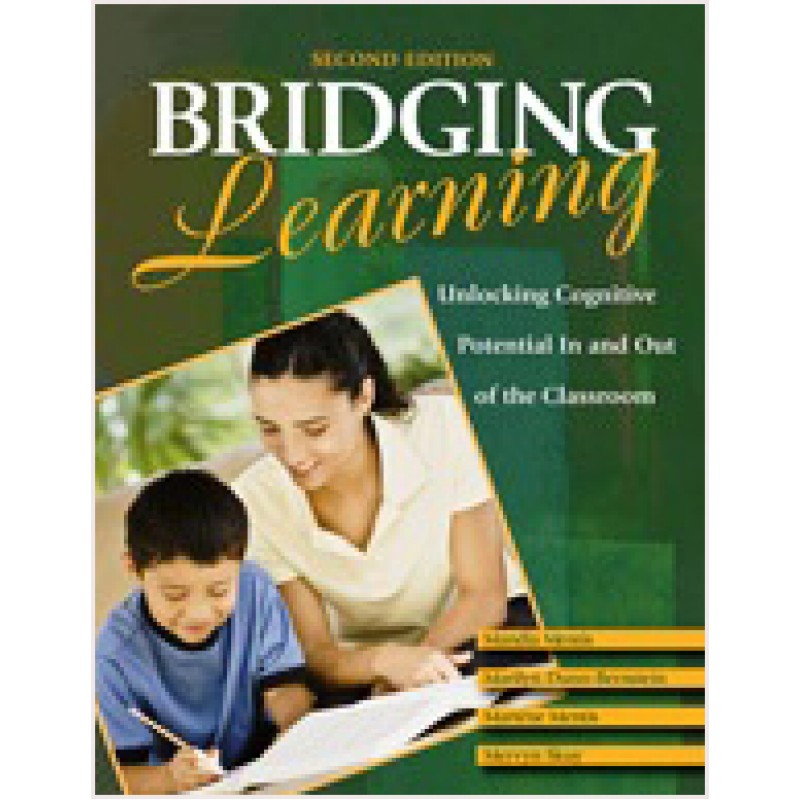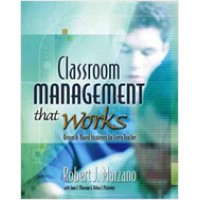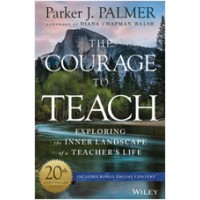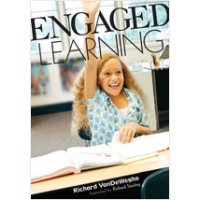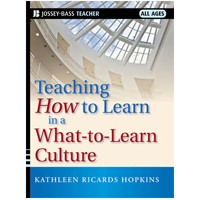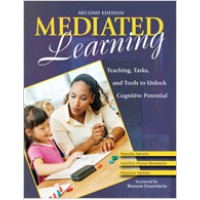Bridging Learning: Unlocking Cognitive Potential In and Out of the Classroom, 2nd Edition
| Author(s) | Mandia Mentis, Marilyn Dunn-Bernstein, Martene Mentis, Mervyn Skuy |
| ISBN10 | 1412969956 |
| ISBN13 | 9781412969956 |
| Format | Paperback |
| Pages | 152 |
| Year Publish | 2009 May |
Synopsis
"This book seamlessly blends theory with practical, real-life applications and activities that can be completed quickly and easily in both school and home/community settings. This encourages a partnership between all stakeholders to help students succeed."
—Betty Brandenburg Yundt, Sixth-Grade Teacher, Curriculum Coordinator
Walker Intermediate School, Fort Knox, KY
"Using real-world examples and applications, this book makes cognitive psychology and cognitive education accessible to all who work with children and other learners. I immediately felt more confident in applying my new thinking and understanding to my practice."
—Wendy Holley, School Psychologist
Bend-La Pine School District, OR
Develop lifelong learners by promoting effective thinking skills in school and beyond!
Based on Instrumental Enrichment (IE), a cognitive education approach pioneered by internationally renowned psychologist and child development expert Reuven Feuerstein, this updated volume provides practitioners with much-needed techniques to develop students' thinking skills and "bridge" these skills to the home and community.
This user-friendly book outlines fourteen core thinking skills that increase students' cognitive capacity, including organization, comparison, categorization, and problem solving. The authors demonstrate how teachers can mediate learning in the classroom and help parents, social workers, counselors, and other adults who work with youth to extend learning beyond the classroom. Each chapter features:
- An introduction to and description of a specific skill
- Examples and applications for formal and informal learning contexts
- An outline of how the skill aligns with Feuerstein's theories of Mediated Learning and Cognitive Modifiability
Expanded to include an overview of many IE-related research studies and quotes to stimulate reflection on each skill, this second edition of Bridging Learning is a dynamic resource for creative educators dedicated to enhancing thinking skills in all learners.
About The Authors:
Mandia Mentis is an educational psychologist and senior lecturer in the Special Education and Educational Psychology Programmes at Massey University, New Zealand. She is an accredited trainer of Instrumental Enrichment (FIE) and the Learning Potential Assessment Device (LPAD), having completed her training at the International Centre for Learning Enhancement in Israel under Reuven Feuerstein. Over the past 20 years, she has run Instrumental Enrichment (FIE) workshops with the Cognitive Research Centre in South Africa and with the Australasian Institute for Learning Enhancement in New Zealand. She has contributed extensively to research projects and publications and has co-written and published two books on Mediated Learning and Instrumental Enrichment. Mentis taught at primary, secondary, and tertiary levels and has worked as an educational psychologist in both special and inclusive education settings. Her teaching and research interests include cognitive assessment, teaching for diversity, and e-learning. Her doctoral research focuses on developing effective e-learning communities of practice.
Marilyn Dunn-Bernstein’s diverse career in education spans 36 years. Along with her 20 years as a high school vice-principal, she has studied under Reuven Feuerstein and implemented the principles of structural cognitive modifiability, IE, and MLE in an extensive range of educational settings. These included 10 years of research, writing, and lecturing with the Cognitive Research Unit of the University of the Witwatersrand and 16 years of work with the Gifted Child Program for disadvantaged individuals in South African townships. Her current work as a psychologist in Australia involves enhancing cognitive, emotional, and creative development in individuals with autism, Down syndrome, Asperger’s, and gifts. She also works with undergraduate psychology and social sciences students, and has been part of the team that runs Feuerstein workshops in Australia, New Zealand, and South Africa. She holds a PhD in education, a masters in psychology, and a degree in human behavior.
Martene Mentis has twenty years of experience in education and has taught at primary, secondary, and tertiary levels. Her diverse educational background includes 6 years with the Cognitive Research Centre, University of the Witwatersrand, South Africa, where she contributed to research, lectured in Instrumental Enrichment (FIE) workshops, and helped develop educational resources, including two books on Mediated Learning and Instrumental Enrichment. She completed her training in FIE under Reuven Feuerstein, at the International Centre for Learning Enhancement in Israel, and in the Learning Potential Assessment Device (LPAD) at the Cognitive Research Centre in South Africa. She has an honours degree in fine arts and a master's degree in education. She currently is an independent scholar, artist, and illustrator, working as an art educator and graphic designer in New Zealand.
Mervyn Skuy is a clinical and educational psychologist who has worked for many years in researching and teaching Feuerstein’s theories and approaches. From 1985 to 2003 he did this within the framework of the Cognitive Research Program, which he established and directed at the University of the Witwatersrand in South Africa. During this time, he was also professor and head of the Division of Specialized Education at that University. He was professor of educational psychology and specialized education at Touro College in New York, and has taught courses in Instrumental Enrichment and Mediated Learning Experience to various organizations and target groups in South Africa, the USA, Israel, Canada, and France. His research has been published in American, British, Canadian, Australian, Dutch, and South African journals and books. He is currently professor emeritus at the University of the Witwatersrand and in private practice as a psychologist. He is also a consultant to Feuerstein’s International Centre for the Enhancement of Learning Potential (ICELP). In this capacity, he is actively engaged in teaching Instrumental Enrichment and in developing programs of study within a project that the ICELP has established in South Africa.

